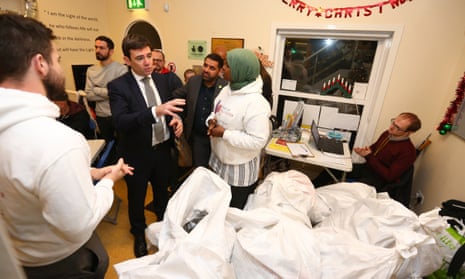Andy Burnham, Labour’s candidate to become the mayor of Greater Manchester, has accused his party of getting its priorities over Brexit wrong by placing single market access at the top of the list ahead of controlling immigration.
The former shadow home secretary suggested the referendum result was not about putting the economy first, as the party leader, Jeremy Corybn, and a string of senior Labour colleagues have suggested, but instead a clear vote in favour of ending free movement across Europe.
Writing in the Guardian, Burnham said Labour’s “collective failure” to tackle concerns over jobs, wages, housing and schools linked to migration had contributed to the loss of the referendum.
But he claimed that politicians were still scared to speak out over the issue because, even in the wake of the Brexit vote, they knew they might face a hysterical reaction.
“Accusations of ‘pandering to Ukip’, xenophobia or even racism are thrown around quite freely. This has the chilling effect of making people who speak out fearful of doing so again,” writes Burnham, who was himself compared to Nigel Farage after telling parliament that Labour had failed to speak out on the issue.
Burnham’s comments underline the extent to which Labour has been grappling with the fallout from the Brexit vote, with deep divisions between the party’s leadership and a number of northern England MPs about how to respond to the challenge.
Sources suggested that his intervention was a deliberate break from national Labour policy and the first step in efforts to develop a distinctive northern voice for the party as he seeks to win the mayoralty in Manchester.
In his article, the MP for Leigh talks of a “growing class divide” on the left of politics in which some middle-class Labour remain voters look down on those who backed leave as “uneducated or xenophobic”.
Burnham said it was simply not true to suggest that northern communities did not value the role migrants played in society, nor that people were hostile to refugees.
“But while it is right to point out that immigration provides an overall net benefit to the country, many of us have been slow to realise that it has a differential impact on different places,” he said.
Burnham argued that Labour activists had been hearing concerns on the doorstep about immigration for at least a decade. While some could be dismissed as “xenophobia or, worse, racism”, not all could.
He said: “The time has come for the left to break out of this dysfunctional cycle of denial and overreaction. By specifying single market access as our highest priority in the Brexit negotiations, we are getting things in the wrong order. The implication of this position is that if Europe made accepting full freedom of movement its price, we would accept it. That is it is not what people voted for.”
The comments place Burnham on a collision course with a number of senior Labour figures, including his successor as shadow home secretary, Diane Abbott, who recently used an interview in the Guardian to warn against her party turning into “Ukip-lite” by shifting to the right on immigration.
The shadow business secretary, Clive Lewis, recently argued that Labour needed to push for the best possible access to the single market, claiming “the Tories have started from the other end”.
Keir Starmer, the shadow Brexit secretary, has argued Labour’s priority should be the single market and jobs while admitting there was clearly a need to act on free movement.
Abbott reacted to Burnham’s comments by claiming he was “getting it back to front”.
“I’m not accusing him of pandering to Ukip,” she said. “I’m just saying he’s wrong. He’s wrong that we don’t talk about immigration and he’s wrong to say we don’t have any answers.”
She expressed surprise that Burnham did not want to put the single market first. “It is really important that we do put jobs and our standards of living first – and that means some sort of access to the single market,” she said.
Abbott pointed out that Ed Miliband had made three speeches on immigration – “three more than any other Labour leader”. He had focused a party political broadcast on the issue in 2015 and had even distributed mugs that called for immigration controls.
She argued that Corbyn was tackling the issue by trying to “boost the factory inspectorate, increase prosecutions for the minimum wage and stop agencies directly recruiting abroad.” He wanted to see an end to exploitative zero-hour contracts and the introduction of a migrant impact fund.
“There is a problem for the party around immigration,” she said. “That is because so many MPs want to move right on immigration policy because they think that will protect them from Ukip.” People wanted fair rules and reasonable management of migration, said Abbott.
Dealing with views on immigration is not just posing a major challenge for Labour but for the entire left, with union leaders also trying to respond to anger among members.
Launching his bid on Friday to be re-elected as general secretary of the Unite union, Len McCluskey said: “Unions understand that workers have always done best when the labour supply is controlled and communities are stable. While we must reject any form of racism, and help refugees fleeing war, we must also listen to the concerns of working people.”
He called for new safeguards “to stop companies cutting costs by slashing workers’ wages and transforming a race-to-the-bottom culture into a rate-for-the-job society”.
